General Council Report 2023

3.1 Introduction
There is no bigger or more important priority for the TUC than building a stronger, more diverse, more inclusive trade union movement. We are striving to put equality at the heart of everything we do, by taking forward the work of our groundbreaking Anti-Racism Task Force, in line with the General Council statement, and tackling sexual harassment at work. Meanwhile, TUC regions and Wales TUC are standing up for workers and their communities across England and Wales, and TUC Education continues to provide reps with high-quality training. As industrial action has spread across the economy, our Solidarity Hub is providing practical support to affiliates and their members. And we’re improving the way we use digital tech across the full spectrum of our activities.
3.2 Black workers
This year’s International Day for the Elimination of Racial Discrimination took place on Saturday 18 March. The TUC supported the demonstration and, in line with composite 19, its focus was on challenging the government’s unlawful migration policy. As part of the mobilisation for the march and rally, we worked with organisations including Stand Up To Racism to organise a conference focusing on the anti-racist and anti-fascist struggle in Britain and internationally. Themes included securing equalities in the workplace, in line with composite 9, and securing racial justice, in line with composite 10.
The disproportionate deaths of Black workers during the Covid-19 pandemic have highlighted many areas where institutional racism impacts the health, safety and welfare of Black workers.
The conference’s opening plenary focused on the action plan and manifesto that our Anti-Racism Task Force has produced, with the closing plenary discussing staying united amid the cost-of-living crisis. The march and rally were well attended, with over 10,000 people taking part in the demonstration.
The disproportionate deaths of Black workers during the Covid-19 pandemic have highlighted many areas where institutional racism impacts the health, safety and welfare of Black workers. In response, the TUC educated union members about the intersection of racism and ethnicity and health, safety and wellbeing issues. We also worked to increase the number of Black health and safety reps. And we campaigned for policy change on ethnicity data collection in work-related injury reporting, and lobbied for ethnicity pay gap monitoring, in line with resolution 35.
The TUC has also campaigned against the government’s policy to deport asylum seekers to Rwanda and against the Nationality and Borders Act. We organised a roundtable and 11 trade unions signed up to support the campaign, and trade unions were well represented at a demonstration on 5 September to support Care for Calais and the PCS court challenge.
In November, the TUC sponsored a vigil to remember the 32 men, women and children who died in the English Channel a year earlier. Along with our affiliates, we have also been active in campaigning against the Illegal Migration Bill, with Paul Nowak writing to home secretary Suella Braverman in March opposing the Bill and asking the government to reconsider.
As we move into the delivery phase of the Anti-Racism Task Force, the implementation and oversight group has been meeting to discuss ways to support unions in actioning the manifesto commitments. This work has been supported by an independent evaluation of the work undertaken so far, as well as ongoing work to look at the experiences of Black workers within the union movement. It’s crucial that unions continue to prioritise this work and make progress against the commitments.
3.3 LGBT+ workers
The TUC LGBT+ Committee worked on a range of issues, focusing on fighting back against the far right, and protecting LGBT+ rights in the Equality Act. The TUC has continued to highlight the shocking rise in transphobia in the UK and the hostile climate created by the government and media for all LGBT+ people. Taking forward resolution 43 on supporting trans and non-binary workers, in April the TUC launched the Trade Unions for Trans Rights Network. It is a space for trade unions to organise together for trans rights at work and in wider society. The network will work closely with LGBT+ charities and community organisations to create and share resources and research, and coordinate campaigns.
We wrote a letter to the government and the EHRC calling on them not to make amendments to the Equality Act on the current definition of sex, following on from advice requested by the government.
We continue to call for progressive reform of the Gender Recognition Act, based on self-identification. We published a statement on the Westminster government’s intervention in the Scottish government’s gender recognition reforms, working closely with the Scottish TUC. We have also continued to call for a complete ban on LGBT+ conversion therapy, with no loopholes for ‘consent’ and no part of our community left out of the ban.
We delivered two new leadership programmes for LGBT+ and disabled workers, bringing together two cohorts of trade union activists. Delegates explored their own approach to leadership, gained a deeper understanding of the trade union movement, and developed a network of supportive leaders across the movement.
The TUC has become a signatory to the Disability Employment Charter, using it as a tool to lobby government to deliver for disabled workers.
3.4 Disabled workers
The Disabled Workers Committee has continued to highlight the shocking treatment of disabled people under this government. Taking forward resolution 37, we have become a signatory to the Disability Employment Charter, using it as a tool to lobby government to deliver for disabled workers. We have contributed to government consultations on the implementation of the national disability strategy, and on the plan for jobs and employment support. We have also worked closely with disabled people’s organisations in the wake of the new Health and Disability White Paper, which the government published in March 2023, and have taken up a seat on the government’s stakeholder engagement board for the white paper.
The TUC marked disability pay gap day by publishing new analysis showing that disabled workers earn 17.2 per cent less than non-disabled workers, with disabled women facing a gap of over £7,000 per year. We also published analysis showing that three in four disabled workers earn less than £15 an hour. We wrote a letter to the minister for women and equalities to call for urgent action, including statutory disability pay gap reporting.
Taking forward resolution 36, we have called for the use of reasonable adjustment disability passports in the NHS and other public bodies. The passports are a useful and practical tool that create change for disabled workers. We have highlighted their importance in our reports, in our speeches at conferences and events, and through blogs and podcasts.
We have continued campaigning to improve access to flexible working for everyone to reduce stigma and to improve accessibility in the design of working arrangements.
We have also continued to raise concerns about the lack of support that people living with long Covid are receiving. We released a report in March 2023 with the Long Covid Support Employment Group, based on a survey of just over 3,000 people with long Covid. The research found shockingly high levels of poor treatment by employers.
3.5 Women
In line with resolution 42, the TUC continues to combat sexual harassment in the workplace and campaigns to change the law, laying the foundations for the culture change that is needed to end sexual harassment and the cultures that allow it to thrive.
The TUC recognises that if we are to challenge sexual harassment in our members’ workplaces, we must ensure that we lead by example in our own trade union workplaces and spaces. In line with resolution 42, the TUC has trained 12 trainers and piloted a new training course for trade unions focussed on recognising and understanding sexual harassment and the practical steps needed to drive culture change across our movement. We continue to work with affiliates to promote our sexual harassment resources for trade unions and have begun work on establishing safe reporting routes for the movement.
Following the Kennedy report into the culture at TSSA, the TUC has offered practical advice and support to the interim management team at TSSA and facilitated access to training. The TUC ran a roundtable with the women’s committee and MeTU to discuss the barriers to change in our movement and how we can overcome them. The General Council agreed a transparent process for handling potential complaints about the conduct of the general secretary.
In line with composite 11, we partnered with Henpicked to run a workshop on menopause in the workplace at our Reps Connect event, to raise awareness and provide practical tools.
Working with the Department for Business, Energy and Industrial Strategy (BEIS), we continue to raise health and safety issues and are working to update all guidance relating to pregnancy and maternity, including health and safety and parental leave rights. Partnering with Maternity Action, we developed a toolkit on pregnancy and maternity rights and safety in the workplace, taking forward resolution 42.
We continued to support calls to make access to telemedical abortion care permanent. In July, we signed a joint public letter to the Director of Public Prosecutions (DPP), condemning the cases being brought against two women for ending their own pregnancies and calling on the DPP to issue guidance to the Crown Prosecution Service (CPS) to stop the prosecution of women who end their own pregnancies with immediate effect. We continue to support calls for protections for buffer zones around abortion clinics and more funding for abortion services, in line with resolution 38.
We continue to be part of the Equal Pay Alliance with the Equality Trust, and in November, in line with resolution 39, we launched an equal pay toolkit. We continue to discuss collective priorities and how we can campaign for equal pay, as well as creating a space for other stakeholders to hear from affiliates about the bargaining that unions do every day for their members on pay and conditions.
We continue to highlight the need for flexible working for women and joined Pregnant then Screwed’s March of the Mummies in October 2022. This saw 15,000 parents take to the streets across the UK to campaign for day one rights to flexible working, better parental leave and pay, and investment in childcare and early years, helping advance resolution 40.
3.6 Solidarity Hub
The Solidarity Hub project was launched in December 2022 and assists unions by providing a suite of support to add value to their campaigns and disputes. A key component of the project is the Dispute Intelligence Database, as detailed below.
Our website hosts a range of resources. The most popular feature is our range of online learning mini-modules and pocket guides aimed at reps. These include resources on preparing for action, effective communications, mental health guidance, acting loud and legal, a pocket book on organising and more. These have already proved very popular, with 46 per cent of all unique visitors to the site in 2023 interacting with one of these resources.
Our Solidarity Stories page is now live, capturing first-hand testimony of unions winning for workers and the methods and tactics used to reach a successful resolution. We are using our extensive media reach to promote these stories and hope that they serve as good, shareable practice to benefit and inspire the wider movement.
Our Dispute Intelligence Database seeks to record and track union campaigns and disputes in extensive detail. Outcomes to date include demonstrating support through all communications from the TUC for unions in dispute, attending picket lines where possible with senior TUC staff, working with our regions to ensure maximum support locally, and providing research to affiliates and more.
The next steps of the project are to continue tracking all disputes, providing the movement with analysis and trends in industrial action and analysis of union wins. We will organise a roundtable discussion of senior union officials to reflect on all recent action and draw out best practice and lessons learned to assess how we can best support unions at all levels and further develop our growing suite of resources to add value to our unions in dispute.
3.7 Digital campaigning and organising
Building a stronger union movement means using the best tech, tools and techniques at our disposal to recruit members, get them active and help win disputes and campaigns.
The TUC’s Megaphone platform enables unions to run online petitions and digital actions to build pressure on employers, recruit new members, engage existing members and build public support. In 2023, the TUC expanded the team supporting union disputes and campaigns, meaning we were able to offer more expert advice on digital tactics.
The platform has now hosted 306 petitions and 522 events, originating from 24 different unions. More than 100 petitions were started by unions in 2022–23. More than 880,000 people have now taken action in support of a union campaign, and there are 470,000 supporters on the Megaphone solidarity email list – a vital resource for the movement. Megaphone supporters are regularly asked to join a union, to recruit others to the union, to promote campaigns in their workplaces and community, to donate to strike funds and to take other actions that strengthen the movement.
In 2022–23, the TUC continued to support affiliates in adopting distributed messaging services to encourage turnout during strike ballots. This has involved setting up tools for affiliates, planning messaging scripts and training activists to have SMS conversations with members at speed and at scale. This has contributed to a significant increase in the number of ballots meeting the thresholds for industrial action.
In 2022–23, the TUC’s reach on social media grew by 65 per cent. Our core social media accounts have a total of 473,000 followers, up from 287,000 a year ago.
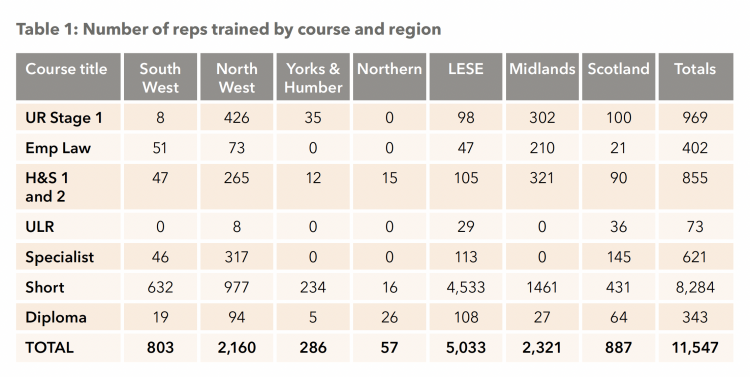
The TUC’s Union finder tool is a shop window for joining a union, helping workers to find the right union for them. In 2023, Union finder experienced a 15 per cent increase in user engagement compared to 2022. This year, we have improved the tool by introducing ways to follow up with users to increase the likelihood they join the union or unions they were recommended. We have also started to collaborate with individual unions to track conversion rates of users referred to their joining pages.
The TUC primarily uses its social media channels to introduce new audiences to trade unions and trade unionism. We share breaking news about unions and work, we seek to build support for key union campaigns, and we promote trade unionism in general.
Over the past year, we have switched our focus to prioritise engagement over information about the TUC, and have deliberately sought to create more viral content. In 2022–23, the TUC’s reach on social media grew by 65 per cent. Our core social media accounts have a total of 473,000 followers, up from 287,000 a year ago. From September 2022 to June 2023, our social channels got 187 million impressions, our videos received 112 million views, and we had more than 9 million likes, shares or comments on our content. We now have the biggest labour movement social channels in the world.
One example illustrates the value of this work. In January 2023, we released our biggest-ever social media post, a tweet that broke the news of the government’s plans to attack the right to strike through new legislation. This post was seen 6.8 million times – meaning that millions of people in the UK found out from the TUC that the government was threatening to fire key workers who go on strike.
The TUC’s TikTok video channel is now its biggest account, with 181,000 followers. Some of our videos have had more than a million views, including those campaigning for a £15 minimum wage (1.3 million views) and our opposition to a rise in the retirement age (1.2 million views). In line with emergency resolution 1, we continued to call for a fair resolution to the Royal Mail dispute, and our video supporting the CWU’s industrial action had 1.8 million views.
The TUC’s Digital Lab programme supports unions with digital change, helping unions understand what best practice looks like and how to make the most of digital.
In 2023, a particular focus has been around a new generation of union membership databases. As set out in composite 20, the TUC has sought to encourage unions to work in collaboration to tackle shared challenges. As a result of shifts in the market for union software and the need to improve systems to meet industrial action thresholds, many unions started researching major change to their databases in 2022. The TUC has delivered events, training sessions and reports, and co-ordinated unions to share experiences. The aim is to help affiliates’ database projects succeed faster and with reduced risk and costs.
The Digital Lab has also worked with a group of affiliates on a collective research project on members’ needs for digital content related to the cost-of-living crisis. with Nautilus International, the Digital Lab supported the development of a new digital approach to onboarding young members, aimed at increasing retention.
3.8 TUC Education
TUC Education provides unions and their workplace reps with high-quality training that enables them to organise, campaign and represent members collectively and individually. Our training is delivered in classrooms via our partnerships with FE colleges in England and Scotland and also online via digital platforms and webinars. We want to deliver our training to reps in whatever way they find most accessible and useful, whether that is in a classroom, online or a combination of both.
In 2022/23, TUC Education had partnership agreements with 17 FE colleges in England and Scotland that ensure delivery of National Open College Network (NOCN) accredited training via the TUC’s core course programme and union courses that are mapped to the TUC Passport to Progress accreditation framework.
The TUC is conducting a strategic review of all trade union education provision in the UK to ensure that the movement has the capacity to organise, campaign and represent members effectively. The recommendations from the review will be made to the TUC Executive in early 2024.
Details of the full TUC Education offer to unions and reps can be found at tuc.org.uk/training
3.9 Online training and support for union reps
During 2022, TUC Education trained over 2,500 reps via its online learning platform. This figure does not include courses delivered by trade union studies centres in Wales and Scotland and by colleges that used non- TUC-hosted learning platforms.
Our most popular courses were Union Reps and Health and Safety Stage 1. In total, 1,138 new reps were trained online in 2022, which represents a significant increase on the previous year’s figures.
Plans are underway to create a fresh and comprehensive programme of UNIONREPS Advanced courses. These courses aim to offer reps an enhanced and specialised training experience, focusing on key workplace issues. The intention is to provide reps with more extensive and in-depth knowledge and skills, equipping them with the necessary tools to effectively address members’ concerns.
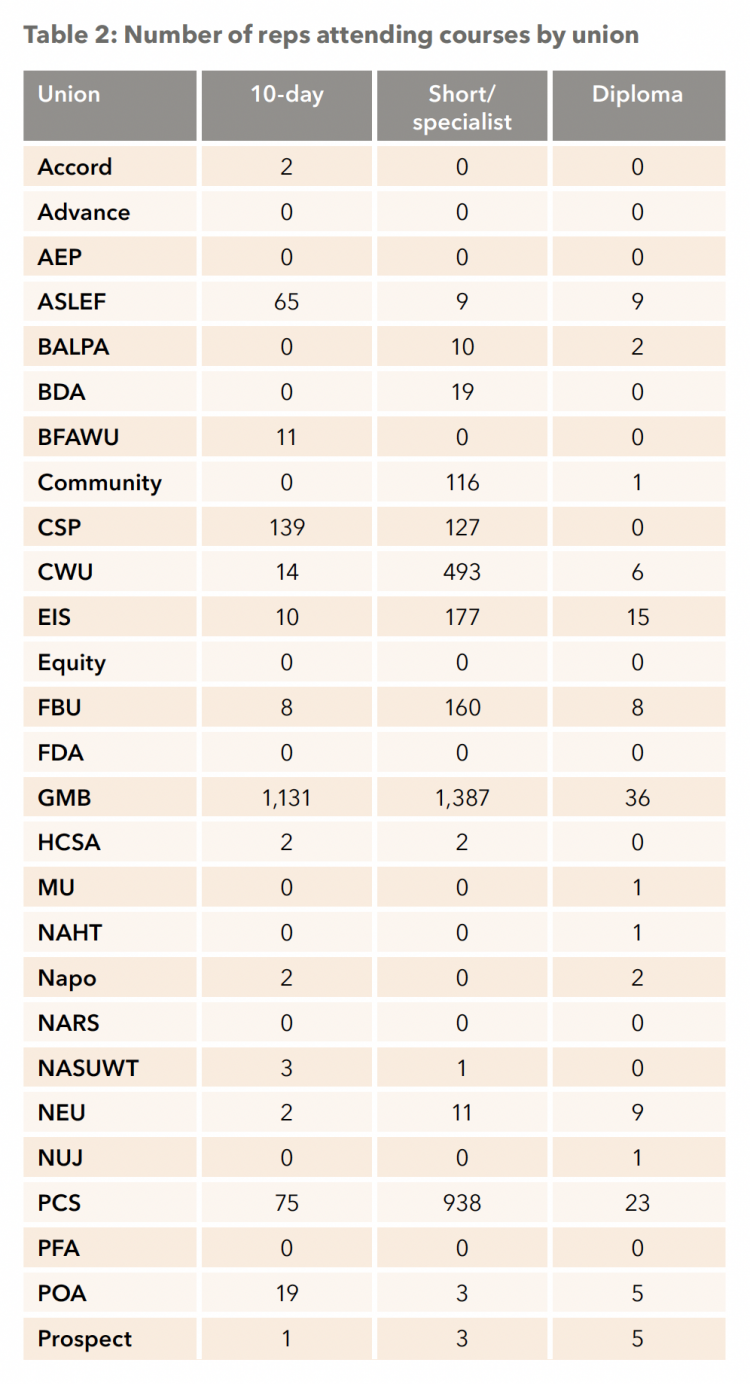
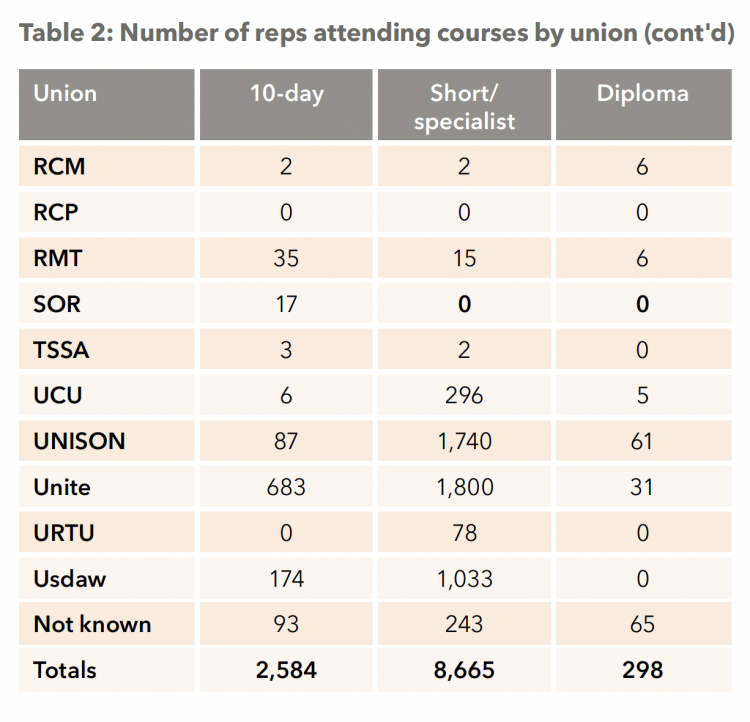
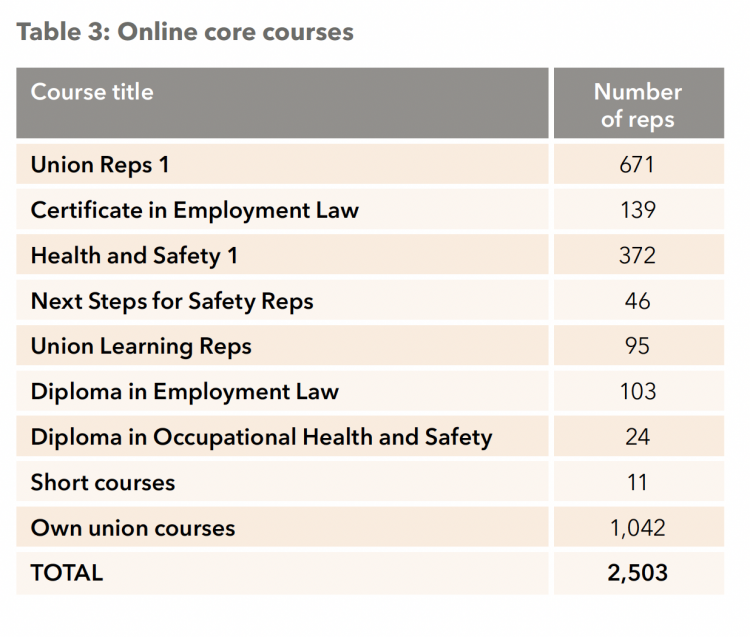
3.10 Digital training support for affiliates
During 2022, the digital learning team collaborated with several TUC affiliates helping them to transform their training programmes. Over the year we have worked with Unite’s South West region to develop online versions of its core training courses. We worked with UNISON nationally on organising and union learning reps’ training, and have developed online versions of a range of courses for UCU that have been used by more than
750 reps. TUC Education also worked with ASLEF, BALPA, the Society of Radiographers, NASUWT and Nautilus International on various projects aimed at introducing innovative training approaches. The digital team developed online resources that complemented affiliate training programmes, enhancing accessibility and facilitating flexible learning. TUC Education worked closely with affiliates to develop new blended and flexible training options that catered to the changing needs of their reps. Affiliates have used the TUC’s existing digital platforms to successfully implement initiatives such as digital credentialing and pathways to guide participants through their learning journey.
TUC Education worked closely with affiliates to develop new blended and flexible training options that catered to the changing needs of their reps.
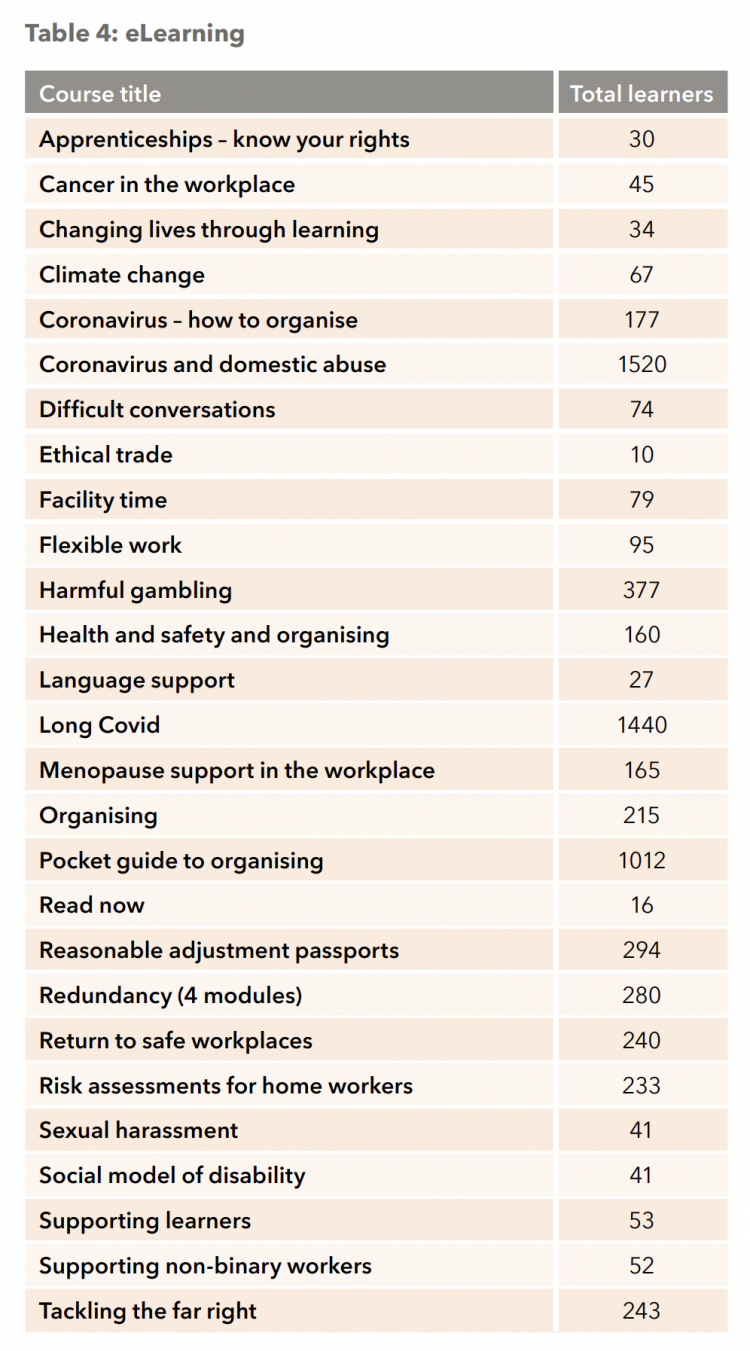
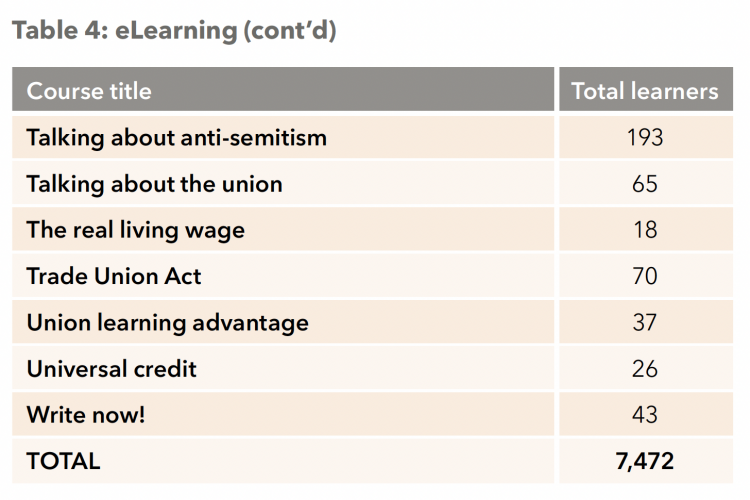
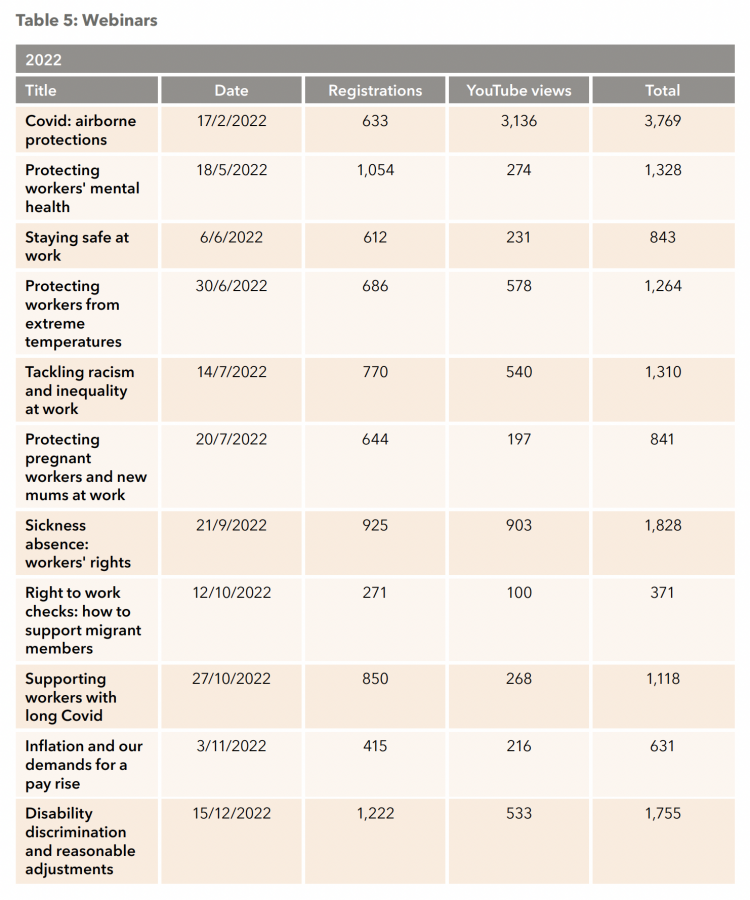
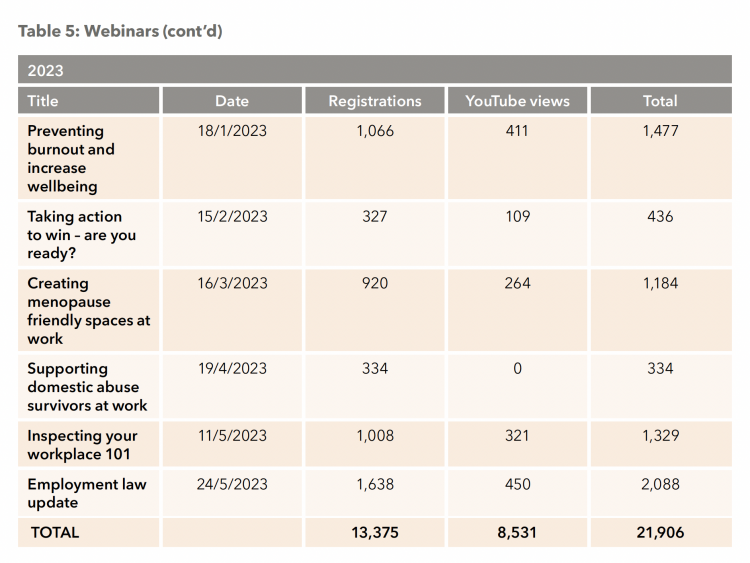
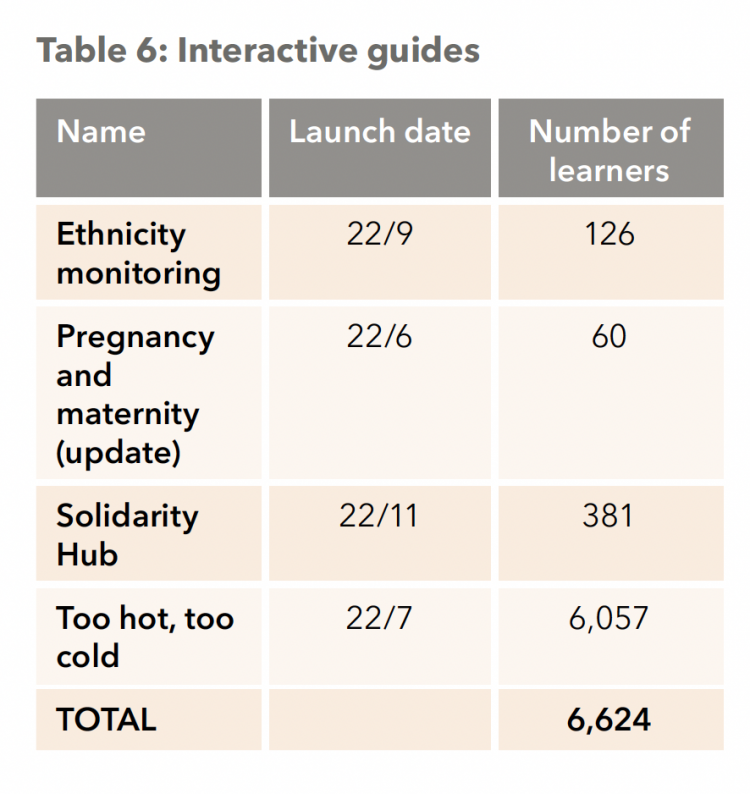
3.11 Unionreps Connect 2022
In October, TUC Education organised a face-to-face training event, Unionreps Connect 2022. It offered training workshops and collaborative spaces for both new and experienced workplace representatives. The attendees listened to engaging presentations and participated in learning sessions on important workplace issues.
The event offered support and guidance on everyday challenges, focusing on key topics such as employment law, health and safety, organising, union learning and equality.
The programme featured presentations from employment rights specialists, interactive workshops with TUC policy experts and discussions with inspirational union reps.
The event also provided the 276 reps attending with the opportunity to network and make new connections.
Unionreps Connect 2022 proved to be extremely popular, with over 94 per cent of reps attending stating that the day helped them gain new knowledge or skills. TUC Education plans to make Unionreps Connect an annual training event.
3.12 TUC Education webinars 2022/23
This year, TUC Education delivered 17 new webinars. The total number of registrations reached 13,375, with an average registration rate of 787 participants per event. The Employment Law Update webinar, supported by Thompsons Solicitors, proved to be the most popular, attracting a record high of 1,638 registrations.
The second most popular webinar focused on disability discrimination. A follow-up survey of the TUC’s webinar audience revealed high demand for further webinars that offer guidance and support on disability issues.
Webinar participants expressed high levels of satisfaction with both the content and the delivery of the sessions, resulting in an average approval rating of 4.59 out of 5.
3.13 TUC Education interactive guides
TUC Education continued to expand its range of short, interactive learning modules. Over the course of 2022, the guides were accessed by over 15,000 reps and we launched a number of new guides.
3.14 Organising Academy
The TUC Organising Academy offers organising training to union officers, organisers and other staff involved in supporting union organising campaigns. The Academy is run in partnership with The Manchester College. In the academic year 2022/23, the Organising Academy trained 36 union officers, 25 from NEU and 11 from HCSA.
3.15 Leading Change Programme
The TUC’s Leading Change ran another programme in 2022, with the latest programme commencing in July 2023.
3.16 TUC review of services
Following the election of Paul Nowak as general secretary – and reflecting composite resolution 21 which was remitted – Kevin Rowan carried out a review of services and support to unions, meeting with 16 general secretaries, the chairs of the TUC’s statutory equality committees, the TUCJCC, the LESE executive committee and regional officers in Yorkshire and the Humber.
The findings from the review were agreed at an executive awayday in February 2023, and recommendations fell into two categories.
First, support for renewing organising included: a focus on diversifying our reps’ base; renewing a trade union education strategy; introducing a ‘solidarity hub’; coordinating unions sectorally; and developing ‘leading change’ programmes for underrepresented groups.
Second, convening the movement recommended changes to the structure of the General Council meetings: a clearer line of sight to the work of regional and Wales TUCs; systemic reviews of the TUC’s performance against key priorities; practical support for unions to be more efficient and effective around procurement; and the introduction of a finance committee to give unions a greater strategic oversight of the financial challenges faced by the TUC.
While there was no appetite or consensus to change the way that the TUC leadership is elected, or to introduce a fixed term of office for the general secretary, it is was agreed to introduce a biennial process for reviewing the performance of the general secretary.
3.17 Regions and Wales
North West
Right across the North West, the TUC has been supporting affiliates in ongoing industrial action, from balloting through to celebrating success. We were able to bring reps and officers together to share best practice on organising and winning ballots, and provide practical support on picket lines.
Many of our unions have achieved success, including OCS workers winning parity with NHS colleagues, the insourcing of hundreds of NHS staff in Liverpool, dock workers and Jacob’s factory staff winning pay rises, and HGS call centre staff fighting for and winning a living wage. These successes have given momentum to our unions, which continue to campaign hard for working people.
Right across the North West, the TUC has been supporting affiliates in ongoing industrial action, from balloting through to celebrating success.
We hosted Lord David Blunkett and members of Labour’s Commission on Skills at Wirral Met to talk about the future of skills and learning at work, part of our wider ongoing work to rebuild union learning in the region and increase the number of learning reps. As part of this, we are successfully delivering a numeracy project in the Liverpool City Region with affiliates, enabling us to increase our staffing in the region to support unions.
As devolution has progressed, we have continued work with metro mayors to ensure strong union representation. We have pushed our agenda on good work in employment charters, with Paul Nowak delivering the annual good employment lecture in Manchester.
South West
After a generation’s worth of service by Nigel Costley, the TUC appointed Ines Lage as regional secretary to lead our work across the South West region.
In the past year, TUC South West has successfully organised the first TUC Black Talent Programme pilot. This saw new Black activists develop leadership and organising skills, and form the hub of a network to help grow and diversify trade union membership and activism in the region.
We also coordinated eight Right to Strike rallies, aligning hundreds of picket lines to bring over 10,000 trade unionists standing strong against the Strikes Bill.
Appalling weather conditions meant that well organised plans for this year’s Tolpuddle Festival fell by the wayside as, due to safety concerns, the event was cancelled at the last minute. High praise remains for the team of staff and volunteers that ensured everyone was kept safe and we look forward to the festival returning next year.
The region has been successful in securing additional staff to lead on key campaigns in skills and on tackling climate change aligned to the TUC’s just transition policies.
Yorkshire & the Humber
As the region’s workers feel the full force of the cost-of-living crisis, we saw a growing number of young activists once again taking to the streets and visiting workplaces on their summer patrol. They were joined as usual by comrades from LO Norway as part of an internationalist effort to recruit increasing numbers of young workers into trade unions.
The region has been successful in securing additional staff to lead on key campaigns in skills and on tackling climate change aligned to the TUC’s just transition policies. The TUC has been instrumental in establishing a Climate Commission in the region, including union representation. Colleagues in the region are working well with unions to build and develop green rep networks.
Following the retirement of Bill Adams, who served the TUC for over 20 years, the TUC began a process of restructuring the regional boundaries of both the Yorkshire and the Humber and Northern regions.
Midlands
The TUC has continued to work with affiliated unions to develop a groundbreaking union organising model in Leicester’s garment industry. Workplace Access Agreements, which guarantee union access to Leicester’s garment manufacturing factories, are now in place. Our campaign is now looking to embed these agreements and the benefits they bring for union organising across fashion brands’ global supply chains.
The Dying to Work Charter appeared in a Private Members’ Bill in parliament brought by Alex Cunningham, another landmark step after many years of union campaigning to provide greater legal protection for terminally ill workers.
We have also been taking steps to support the diversification of our lay rep base. We have established an enthusiastic Black Activist Network and are currently exploring developing a network of women officers to help guide our campaigning and organising work.
The general secretary showed support for the first strike in Amazon, visiting workers in Coventry alongside the Midlands regional secretary.
Northern
In what has been a year of considerable industrial activity, the TUC has supported industrial action campaigns across the public and private sectors in the north-east and Cumbria.
Working with unions locally, we will be launching our Black Activists’ Development Programme in September with networking, leadership and organising skills opportunities. Our focus on bringing reps together saw us hold a reps’ summit in May, where we shared and developed organising opportunities around the North of Tyne Combined Authority’s Good Work Pledge.
We continue to lead and support campaigns for women in the region, with this year’s Reclaim the Night! event to protest against violence against women being one of the best attended in recent years.
With support from the North of Tyne Combined Authority, we have been able to rebuild our support for union learning reps and workplace learning. We are hoping to expand this work in the months ahead.
London, East & South East
There have been many industrial disputes located in London, the south-east and the east of England. We continue to build support for unions taking action, publicising information about disputes, attending picket lines and events, and delivering messages of solidarity.
We have relaunched our regional young members’ network and LGBT+ solidarity network, and will be starting our Black Activists’ Programme just after Congress. We have reviewed and amended our regional structures to increase union participation, ensuring we receive information and requests for support and can then share these across unions and trades councils. We now have reps representing 94 per cent of union membership on our regional council.
Wales TUC
Last year, we launched our Black Activists’ Development Programme. The first cohort of trade unionists – who are all women activists – are reaching the mid-point of the programme, and we are working with them to determine how best we can support their ambitions, whether within their union, in politics or in wider civil society.
We have also continued to develop resources for reps and officers to make workplaces safer and more inclusive. We launched a toolkit on how to deal with workplace sexual harassment with Welsh Women’s Aid earlier this year, as well as an action plan on steps to achieve LGBT+ inclusive workplaces. We have also launched a pilot of a unions into schools initiative and are looking forward to welcoming a delegation of Norwegian trade unionists this summer to support young trade unionists to adopt their ‘street patrol’ organising model.
Thanks to continued investment by the Welsh Government, the Wales Union Learning Fund (WULF) is delivering training for thousands of workers in Wales every year, and we also support hundreds of reps through our Trade Union Education offer. Both have been adapted to support the aims of a just transition, including a negotiating course for reps and officers and a collaboration with Umeå University, Sweden, to run a residential course in Cardiff on ‘workers as agents of a green and just transformation’.
Thanks to continued investment by the Welsh Government, the Wales Union Learning Fund (WULF) is delivering training for thousands of workers in Wales every year.
While Wales has also seen its fair share of industrial action in the devolved public sector, trade unions have continued working with the Welsh government and employers as part of our social partnership arrangements. Through the Workforce Partnership Council, we have been developing a four-day working week pilot in the devolved public sector and the Social Care Fair Work Forum has been devising a plan for sectoral collective bargaining for the outsourced workforce.
In May, the Social Partnership and Public Procurement Act received royal assent. This new law requires the Welsh government to set up a Social Partnership Council and gives recognised unions a say over the strategic priorities of devolved public bodies. It also puts the two-tier code on a statutory footing and introduced social clauses in large public construction projects. Trade union officials were seconded to the Welsh government to develop the legislation, encapsulating the Welsh government’s view that strong industrial relations are an integral part of public services.
The general secretary, and Wales TUC general secretary, met the first minister Mark Drakeford in March. They also visited Airbus in Broughton in July, along with shadow employment rghts minister Justin Madders MP and Unite officers and reps.
Stay Updated
Want to hear about our latest news and blogs?
Sign up now to get it straight to your inbox
